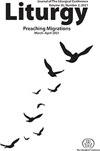Preaching Hope: Lessons from Friedrich Schleiermacher
IF 0.3
0 RELIGION
引用次数: 0
Abstract
In the First Epistle of Peter, the author exhorts Christians to “always be ready to make your defense to anyone who demands from you an accounting for the hope that is in you ...” (1 Pet 3:15) Giving an account of one’s hope is a challenging task in the best of times. Yet, in moments of tragedy and extreme loss, this task can seem impossible, if not cruel. Demanding expressions of hope can inadvertently (or quite intentionally) shame people in moments of shaken faith. Is doubt in the face of tragedy a moral failure? Are fear and uncertainty manifestations of a weak faith? One might hope that familiarity with the story of Jesus in the Garden of Gethsemane would suffice to disabuse any Christian of such thoughts. Yet, it is a common occurrence to hear hope juxtaposed to fear and uncertainty as poles in a zero-sum game. It is an unfortunate reality that many Christians have been taught that having hope is synonymous with having certainty. In moments of tragedy, pastors and liturgical ministers are tasked with facilitating liturgies that defend and proclaim Christian hope. The purpose of this essay is to introduce a resource to help those charged with this daunting task. A sermon written by the nineteenth-century Lutheran theologian and pastor, Friedrich Schleiermacher, offers us a provocative example of how to preach hope in the face of tragedy. The sermon was published for the first time in English in 1977 in the Journal of Religion with translation and commentary by Albert Blackwell. This brief sermon can serve as a guide in how to avoid callously imputing emotions and using idolatry as a form of consolation. In what follows, I will show how the sermon deconstructs potentially harmful forms of hope and reconstructs a Christian hope that is pastorally and theologically fruitful. By integrating our pain, fear, and uncertainty into our worldview, we begin to construct a Christian hope that refuses to denigrate this world and commits us to our Christian vocation of divinizing this world.宣扬希望:弗里德里希·施莱尔马赫的教训
在《彼得前书》中,作者告诫基督徒“时刻准备好为任何要求你说明你心中希望的人辩护……”(彼前3:15)在最好的时候,说明自己的希望是一项具有挑战性的任务。然而,在悲剧和极度损失的时刻,这项任务似乎是不可能的,如果不是残酷的话。在信仰动摇的时刻,要求表达希望可能会无意中(或相当有意地)让人们感到羞耻。悲剧面前的怀疑是道德上的失败吗?恐惧和不确定性是软弱信仰的表现吗?人们可能希望熟悉耶稣在客西马尼花园的故事就足以打消任何基督徒的这种想法。然而,经常听到希望与恐惧和不确定性并列为零和游戏中的极点。不幸的是,许多基督徒被教导,拥有希望就是拥有确定性。在悲剧时刻,牧师和礼拜牧师的任务是促进捍卫和宣扬基督教希望的礼拜仪式。本文的目的是介绍一种资源,以帮助那些负责这项艰巨任务的人。19世纪路德会神学家兼牧师弗里德里希·施莱尔马赫的一篇布道为我们提供了一个如何在悲剧面前宣扬希望的挑衅性例子。该布道于1977年首次以英文发表在《宗教杂志》上,由阿尔伯特·布莱克威尔翻译和评论。这篇简短的布道可以作为如何避免无情地指责情绪和将偶像崇拜作为一种安慰的指南。在接下来的内容中,我将展示布道如何解构潜在有害的希望形式,并重建在牧师和神学上富有成果的基督教希望。通过将我们的痛苦、恐惧和不确定性融入我们的世界观,我们开始构建一种基督教的希望,拒绝诋毁这个世界,并致力于我们的基督教使命,即占卜这个世界。
本文章由计算机程序翻译,如有差异,请以英文原文为准。
求助全文
约1分钟内获得全文
求助全文

 求助内容:
求助内容: 应助结果提醒方式:
应助结果提醒方式:


